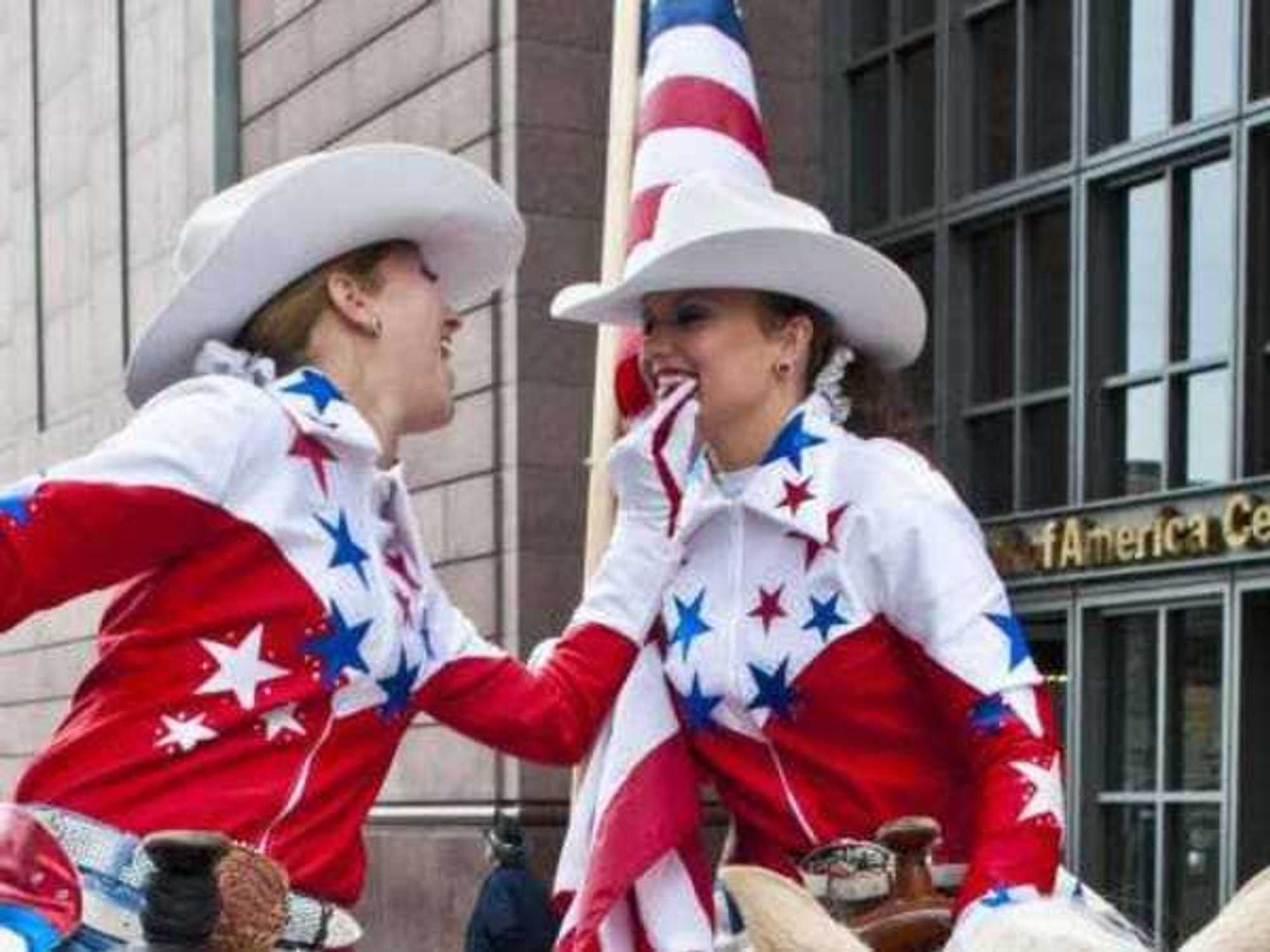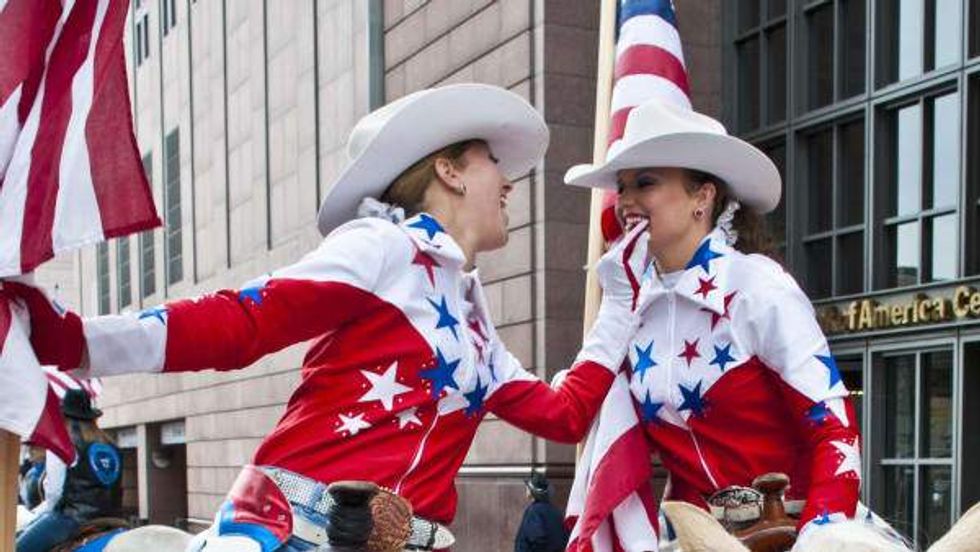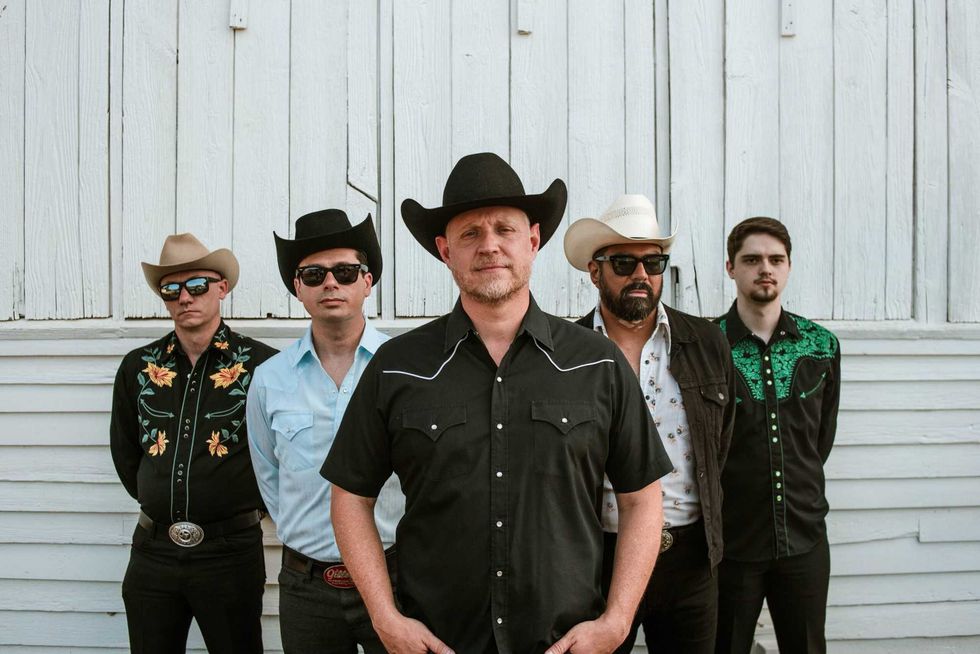No Retreat, No Surrender
Springsteen's Forrest Gump beef and death row wishes, the countdown screens tosongs 140-131
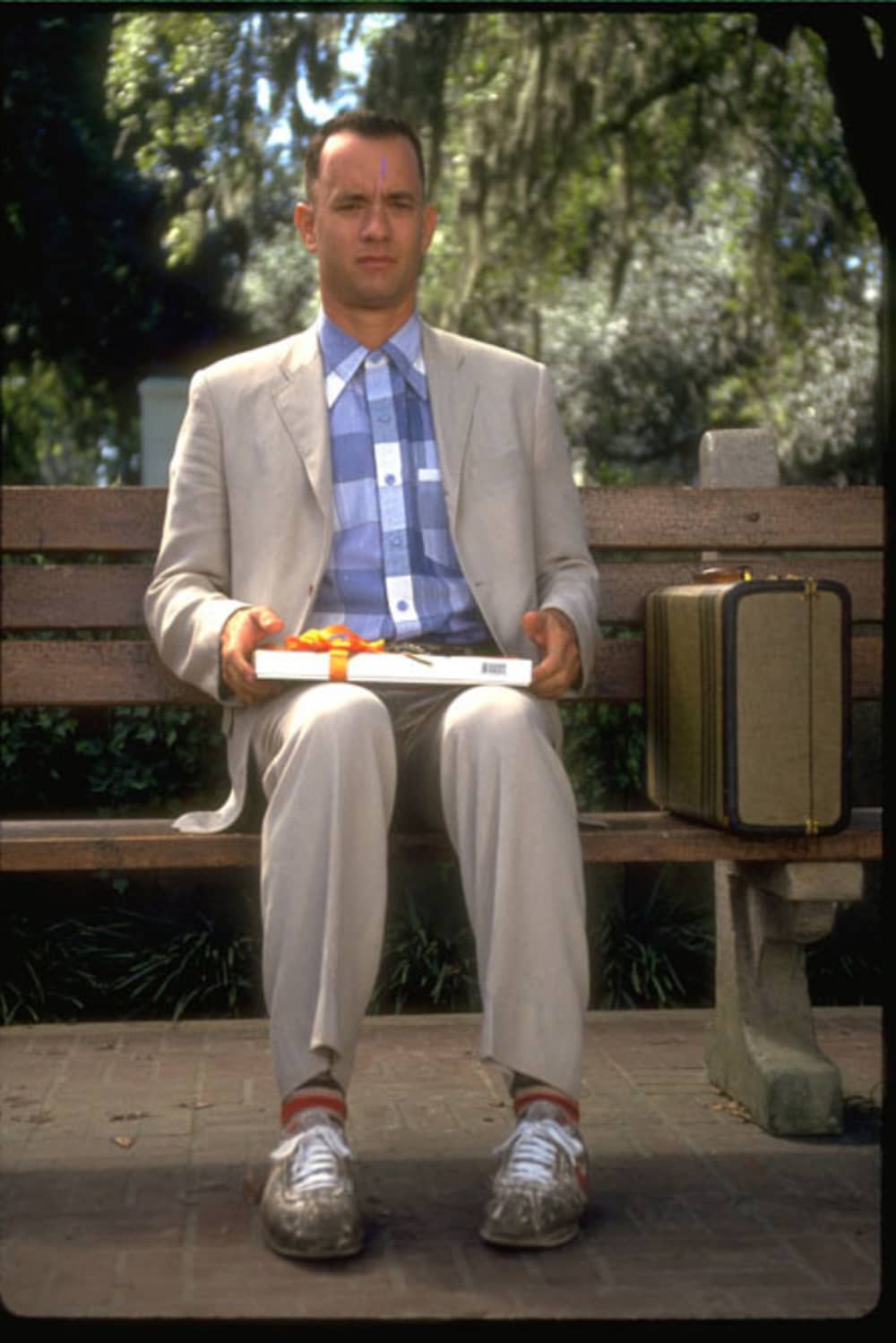 Did you know that Springsteen wants to see Forrest run — right off a cliff?
Did you know that Springsteen wants to see Forrest run — right off a cliff?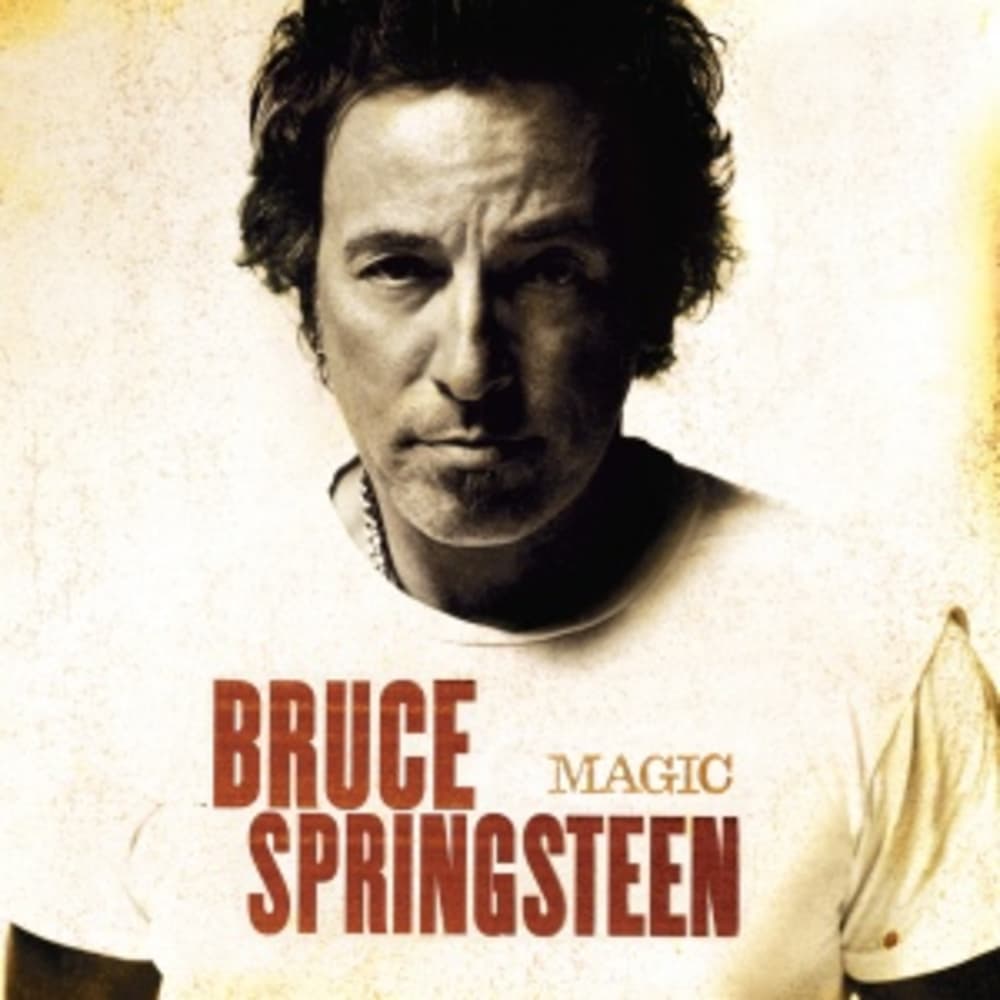 The Ultimate Springsteen countdown reaches songs 140-131.
The Ultimate Springsteen countdown reaches songs 140-131.
The Bruce Springsteen countdown rolls on, gathering almost as much momentum as Betty White on Saturday Night Live. If you've always thought that movie talk is the one thing that's been missing from The Boss' career this is the edition for you.
Song 140: “What Love Can Do”
Album: Working On a Dream
Adobe Flash Required for flash player.
A solid piece of mid-tempo rock on "Working On a Dream," “What Love Can Do” is played and performed well, solidly written and constructed, just a good effort all around. It might be ultimately forgettable due to its lack of bold strokes, but it makes a good impact while you’re listening.
Bruce has noted that he actually wrote the song while the band was making "Magic", but ever the thematic stickler, didn’t feel like it quite fit. Instead he used it as the jumping-off point for the album to come. Personally, I don’t hear it either as a huge departure from the stuff on "Magic" or a linchpin for "Dream", but the albums both worked just fine, so it’s all good.
Springsteen’s lyrics feature some powerful imagery, although some of it is a bit strained. I do like the urgent bridge a lot. The song is about love’s power in the face of all of life’s external pressures, which are rendered by Bruce in almost apocalyptic terms. Even though love isn’t a cure-all, Bruce seems to say, it does offer something. In that way, “What Love Can Do” manages healthy doses of realism and optimism all at once.
Song 139: “Kitty's Back”
Album: The Wild, The Innocent, and the E Street Shuffle
Adobe Flash Required for flash player.
A song that has earned quite a reputation as a live warhorse, this long effort from Bruce’s second LP in 1973 doesn’t quite live up to that billing as a recording. It has its moments of brilliance, which make it a fun listen, but there just aren’t enough to sustain the extended running time.
Springsteen probably understood the trade-off with songs like this, that you run the risk of sounding self-indulgent on record to give the song what it needed to be a concert showcase. Still, the playing in the longer instrumental sections is universally fine, from Bruce’s elegiac guitar work at the start, the high-speed organ solo from David Sancious, and a little strut from the Big Man himself, making one of his first spotlight appearances in the group.
Actually, the music carries the song a long way, and Bruce wisely keeps the band sections at a high tempo only to slow it down for the verses so that the attention span never lags. Unfortunately, all of the motley characters in the song only contribute to a meager tale of a spurned lover unable to resist Kitty when she returns. It’s as if Bruce knew all this, hence the hep-cat slurring which makes the lyrics so hard to decipher.
All is forgiven once we get to that adrenaline-rush of a refrain, the whole band chipping in like some rough-and-tumble street doo-wop group. It’s a bumpy ride to get there, but that alone makes “Kitty’s Back” worth the price of admission, even when you’re not surrounded by 35,000 other Bruce fans.
Song 138: “Youngstown”
Album: The Ghost of Tom Joad
Adobe Flash Required for flash player.
Bruce addresses a topic here that back in the day might have been fodder for one of Robbie Robertson’s topical takes on America. When I hear the song I can almost hear Levon Helm embodying the main character. (The Band actually did do a darn good version of “Atlantic City” in the early 90’s, but I digress.)
Some of The Band’s instrumental virtuosity might have come in handy to spice this one up a bit, as the track, as found on "The Ghost of Tom Joad," is a touch dreary. Springsteen has since juiced the song up electrically in concert with the E Street Band; you can check out those results on the "Live In New York" release. But other than some probing violin from Soosie Tyrell and flashes of pedal steel from session man Marty Rifkin, there’s nothing too exciting going on in the original.
The lyrics, however, are strikingly good, telling what seems like an entire history of the steel industry in amazingly economic fashion. Yet by telling it through the eyes of a disenchanted worker, he never loses sight of the human drama at the heart of the story.
In an industry that spanned hundreds of years and numerous wars, the greed of the business owners is eventually what brings it all down, and the hurt that fact engenders registers in Springsteen’s vocal turn.
Bruce subtly adds layers to the story. His narrator reveals the pride he had in his job with florid descriptions of sights that other people might find ugly: “Them smokestacks reachin’ like the arms of God/Into a beautiful sky of soot and clay.” And when he makes his complaint, it’s not to a woman; the “Jenny” in the song is actually the nickname of a blast furnace.
Only this machine can possibly know the betrayal he’s been dealt by his bosses: “Once I made you rich enough, rich enough to forget my name.” It’s a credit to Springsteen that he hasn’t forgotten these people, and the disenfranchised workers of the steel industry couldn’t have asked for a more eloquent spokesman.
Song 137: “My Beautiful Reward”
Album: Lucky Town
Adobe Flash Required for flash player.
A quick look at the title and the song’s placement on "Lucky Town" might lead you to believe that this was another of the many happy marriage-inspired tunes cropping up around that time from Springsteen. The music, all warm keyboards and perky acoustic guitar, fuels that speculation even further.
But closer inspection reveals unease at the heart of the song, which, considering its placement at the end of the album, sends "Lucky Town" out on a fascinatingly ambivalent note. All of the contentment that Bruce had displayed up until that time is momentarily set aside. After all, the song says that he’s “searching," present tense, for his reward.
I would even venture a guess that the song was more inspired by his failed first marriage than his successful second one. The bridge talks about him briefly finding salvation, only to crash back down to reality. It’s as if he was retracing his steps to make sure he didn’t make the same mistakes.
Even more mysterious is the final verse, in which Bruce transforms into a large bird to survey the territory. The music might lead you to believe that he’s already found what he covets, but the words will tell you that the search continues.
Song 136: “Leah”
Album: Devils & Dust
Adobe Flash Required for flash player.
In past years, when the Springsteen express was an unstoppable force and received airplay for every utterance he made on record, a song like “Leah” would have been swept up by the momentum of it all and possibly found a spot on the charts. It is an expertly constructed and good-hearted to its core, full of touching but never treacly sentiment.
That’s because Springsteen always has a firm hand on the tiller and knows how to balance the gooey stuff like love and redemption with the darker corners you have to navigate to get to those lofty heights. Thus, his narrator here lays his mistakes bare: “With this hand I’ve built/With this hand I’ve burned.”
And Bruce also knows that even domestic contentment takes vigilance: “I wanna live in the same house, beneath the same roof/Sleep in the same bed, search for the same proof/As Leah.”
Set to a ringing acoustic guitar and featuring a distant trumpet part by Mark Pender, “Leah” also hits the musical pleasure center much more accurately than some of the less tuneful numbers on "Devils & Dust." All but the diehards might have missed it the first time around, but it’s worth searching “Leah” out if you haven’t made her acquaintance.
Song 135: “Better Days”
Album: Lucky Town
Adobe Flash Required for flash player.
After years of turmoil, Bruce was beginning to feel pretty good about himself in the early 90’s. Maybe some of his fans weren’t ready to celebrate though, because they greeted his double-release of "Human Touch" and "Lucky Town" with a shrug compared to the rapturous reception for most of his other work. “Better Days” is the poster child for this happier Springsteen, and, as such, sometimes gets a bad rap.
If there is a flaw with the song, it’s that it seems calculated to be the kind of big anthem that Bruce tossed off with little effort throughout the 70s and 80s. Some of that strain is audible, but a radiant chorus goes a long way to hiding it. Extra credit should go to the backing vocals of Lisa Lowell, Patti Scialfa, and Soozie Tyrell, because they really send the refrain skyward.
It’s also easy to miss some of the self-reproach inherent in the lyrics if you focus on the uplift. “It’s a sad funny ending to find yourself pretending/A rich man in a poor man’s shirt,” Bruce sings, a line that speaks volumes about his ambivalence toward the fame and fortune his superstar status has accorded him.
So maybe “Better Days” never became the anthem it was intended to be. Maybe it never stood a chance. At the very least Bruce earned the right to sing about the good stuff for a change, no matter what his audience might have wanted.
Song 134: “You'll Be Coming Down”
Album: Magic
Adobe Flash Required for flash player.
Bruce could just as easily be speaking to a young pop star as he is to a former love. That’s how malleable the lyrics are in “You’ll Be Comin’ Down,” a catchy bit of mid-tempo balladry off "Magic." The message is the same: Be careful when things are given to you easily, because just as easily they can be taken away.
I’m not sure that the mix does this song a lot of credit. It’s all a bit jumbled once you get into the heart of the song, and that’s too bad because there are certain elements which deserve a clear listen, such as the bell-like acoustic guitars at the start and the rumble-and-snap interplay between Garry Tallent and Max Weinberg. At times, even Bruce’s even-tempered vocals seem to get buried.
If Bruce’s message is a bit trite, the methods he employs to convey it carry the song out of the hum-drum. Color seems to be the main motif here, as just about everything in the crayon box short of Burnt Sienna can be found in Bruce’s descriptions. He also does a nice job of interweaving the mundane details of a dreary life with fantastical elements that portend bad tidings.
“You’ll Be Comin’ Down” is yet another example of Bruce taking what could have been a mediocre track and imbuing it with enough forceful personality and dazzling talent to push it across.
Song 133: “Working On a Dream”
Album: Working On a Dream
Adobe Flash Required for flash player.
Springsteen’s affection for Roy Orbison is well-documented and easily detected by listening to certain songs. The title track and lead single off his 2009 album, "Working On a Dream," rises and falls acrobatically like some of Orbison’s best, and you can only wonder what that supernatural voice would have done wrapped around this excellent offering. Still, the soaring harmonies of Bruce and Little Steven aren’t that bad of a substitute.
As all singles should, the song goes down smooth and grabs you at first listen, even if it isn’t the meatiest offering in the man’s catalog. Crisp and clean, there isn’t an ounce of flab on the song, and the whistling solo is something new.
A lot of folks tried to tie the song to the ’08 election, and Bruce’s vocal support of President Obama did nothing to dissuade this reading. While the tenor of the song might have fit in with the prevalent mood, in the literal sense it’s more a song of longing than anything else. The narrator is toiling away at some sort of back-breaking manual labor while dreaming of his love that’s far away.
Though ultimately hopeful, there are elements of sadness and desperation in those harmonies that can’t be denied. Those elements linger with you even after the feel-good power of the music dies away.
Song 132: “Dead Man Walkin'”
Album: The Essential Bruce Springsteen
Adobe Flash Required for flash player.
I saw it a long time ago, but I recall being pretty impressed by the film "Dead Man Walking." Considering it was coming from Tim Robbins, I was expecting a pretty heavy-handed diatribe against the death penalty, but instead the film simply told a story and let everyone else do the judging if they wished.
When Sean Penn admits his guilt to Susan Sarandon right before his execution, it’s a pretty powerful moment.
No, I’m not auditioning for Roger Ebert’s job, just simply making a point that Springsteen’s theme song for the film is treated in a similarly restrained, yet still potent fashion. I’m always a little leery of movie themes that try to work the title of the film into the song, and I have to say I’ve never been able to fully put that aside with this song.
Bruce repeating the title seems a bit forced to me, and it also deprives the song of some of its meaning out of context.
But I will say he keeps the rest of the lyrics vague enough to evoke emotion for people other than death-row inmates. The line, “Between our dreams and actions lies this world,” is a pretty concise summation of the way that the circumstances of life can derail the best intentions.
The spare acoustic rendering certainly brings chills. So, while it might not quite be up to the level of some of his other soundtrack work (which does set the bar pretty high), “Dead Man Walkin’” gets this reviewer’s thumbs-up.
Song 131: “My Best Was Never Good Enough”
Album: The Ghost of Tom Joad
Adobe Flash Required for flash player.
An oddly sarcastic and funny postage stamp stuck on the somber envelope of "The Ghost of Tom Joad," this song finds Bruce taking umbrage with all vapid bromides designed to make us feel good about our miserable existences. I’m particularly grateful that he took aim at Forrest Gump because I’m still bitter about that piece of tripe winning best picture over Pulp Fiction — even if it did happen way back in 1994.
Outrage, I say. Still, 16 year later. (I know. You’re thinking, “Again with the movies.”)
This is the kind of tossed-off, humorous trifle that Dylan might have thrown on one of his early albums with a throwaway title like “Cliché Blues #27” or something like that. Bruce deepens it a bit by adding the romantic angle. The reason he’s hearing all of these one-liners is because he couldn’t hold on to his girl, which probably makes the sappiness of those sayings even more infuriating.
Or maybe this is Bruce’s way of saying that the social ills he had categorized in the album’s previous songs were all too easily dismissed by such tired slogans. Whatever the case, “My Best Was Never Good Enough” is a strikingly odd way to end things, and yet somehow ironically apropos.
